
In April, Active Group, in collaboration with Experts Club, conducted an online survey of 800 Ukrainians regarding their attitudes toward various countries. The goal was to determine their level of trust and sympathy.
Ukrainians have the most positive views of the United Kingdom (77.2%), Canada (76.3%), and France (74%). Germany has 68.8% support. Attitudes toward the US are divided: 36.1% are positive, 31.2% are neutral, and almost 30% are negative.
Negative attitudes prevail towards Hungary (56%) and Slovakia (34.6%), which is related to their official position on the war. Despite economic ties, China has only 19.6% support, with 42.8% negative.
Japan enjoys high trust (66%), South Korea 49.7%. Turkey receives mixed assessments: 46.4% positive, 12% negative. Brazil and Saudi Arabia are viewed as moderately positive or neutral.
Experts note that Ukrainians value moral support, not just economic ties, and do not recognize “neutrality” without concrete assistance.
“We conduct this important research on an ongoing basis and will continue to do so on a quarterly basis,” commented Oleksandr Pozniy.
” The image of countries in the perception of Ukrainians can be improved through support for projects aimed at rebuilding Ukraine, establishing direct dialogue through embassies and public diplomacy projects, explaining their position through historical context, and not avoiding publicity,” added Maxim Urakin, director of development and marketing at Interfax-Ukraine and founder of the Experts Club analytical center.
The presentation of the study in English is available at link.

Voting in the presidential election began in Romania at 7:00 a.m. on Sunday. The second round features George Simion, representative of the right-wing Alliance for the Unity of Romanians, and Nicușor Dăncilă, the incumbent mayor of the capital Bucharest, who received the most votes in the first round on May 4.
“We voted so that only Romanians decide our future, for Romanians and for Romania,“ Simion told reporters outside a polling station.
“We decide what kind of country we want to be: a country of hope, dialogue, and development,” Dănălescu wrote on Facebook.
According to Reuters, despite the fact that 38-year-old Simion won 41% of the vote in the first round and 55-year-old Dan only 21%, opinion polls show that they have almost equal chances of winning, or show a slight advantage for Simion. Earlier, the Experts Club think tank released a video analysis dedicated to the most important elections in the world in 2025. For more details, see here —
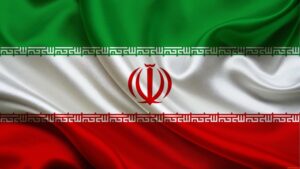
Iran has become the country with the highest level of negative attitudes among Ukrainians, according to a sociological survey conducted by Active Group and the Experts Club analytical center in April 2025.
According to the results, 60.9% of respondents rated Iran negatively (32.9% — mostly negative, 28.0% — completely negative). At the same time, only 5.0% of respondents expressed a positive attitude (2.8% — mostly positive, 2.2% — completely positive). Another 27.9% indicated a neutral attitude, and 6.2% abstained from answering.
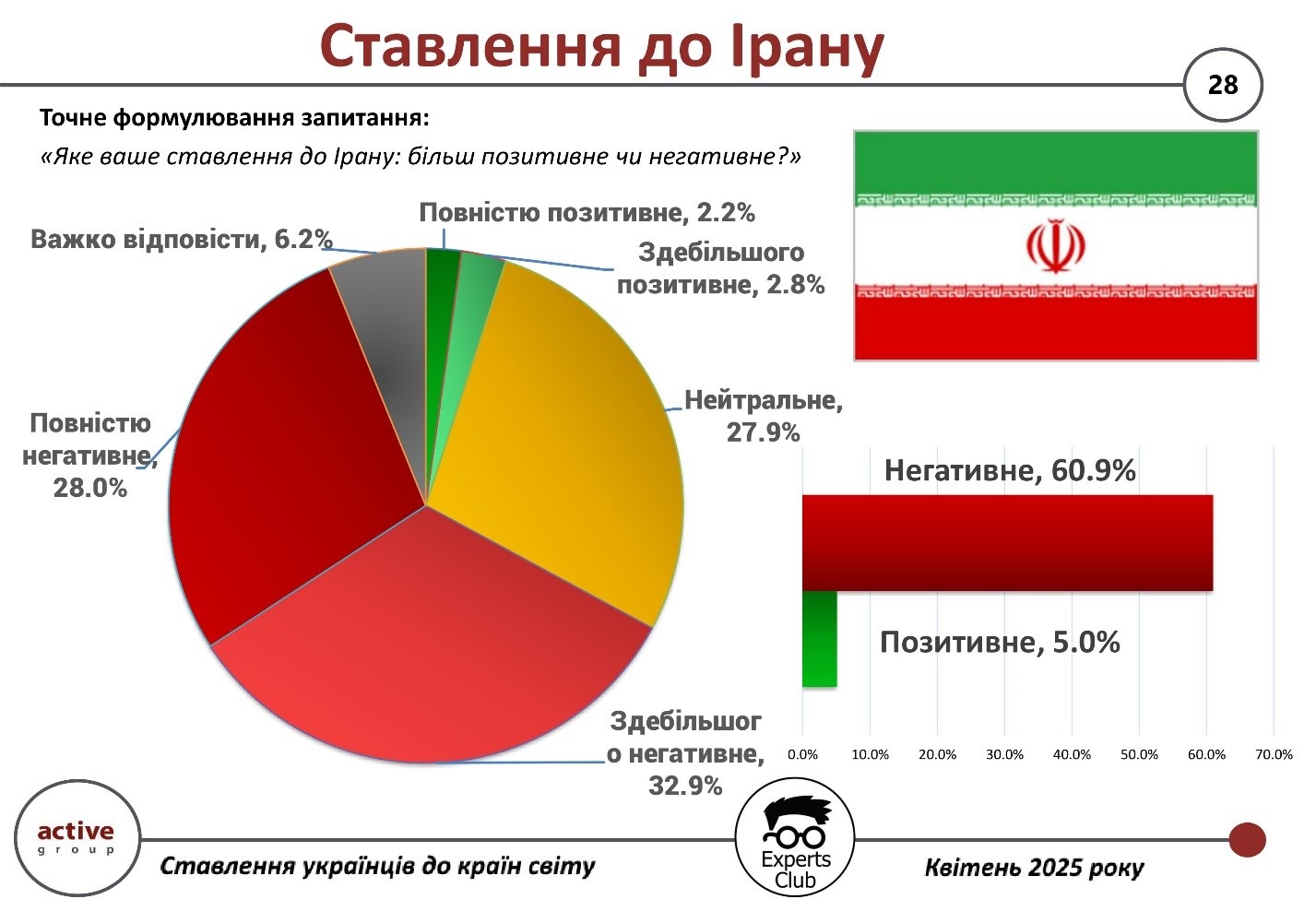
“The high level of negativity towards Iran is explained by its foreign policy and alliance with Russia. These results reflect the geopolitical reality,” said Oleksandr Pozniy, co-founder of Active Group.
The presentation of the study is available at the link.
ACTIVE GROUP, DIPLOMACY, EXPERTS CLUB, Pozniy, SOCIOLOGY, URAKIN
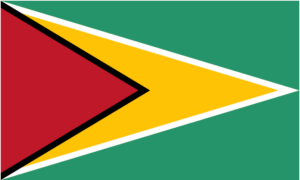
According to the results of a survey conducted by Active Group in collaboration with the information and analytical center Experts Club, the vast majority of Ukrainians do not have a formed opinion about Guyana — 71.8% chose the neutral option.
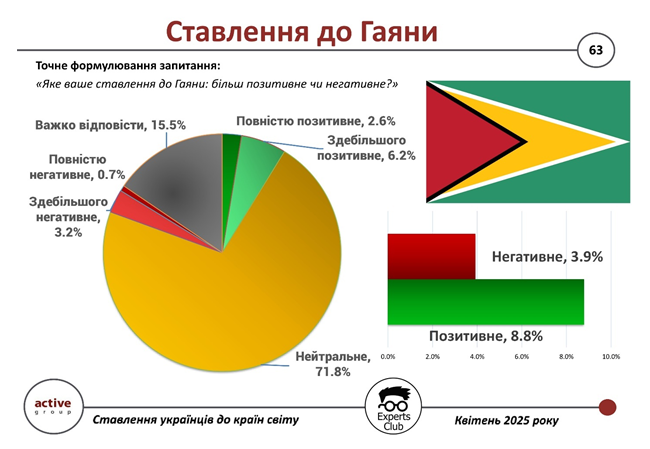
A positive attitude was expressed by 8.8% of respondents: 6.2% said “mostly positive” and 2.6% said “completely positive.” In contrast, only 3.9% expressed a negative attitude (of which 3.2% said “mostly negative” and 0.7% said “completely negative”). At the same time, 15.5% of respondents were unable to answer this question at all.
“Such a high percentage of neutrality and ‘difficult to say’ responses indicates that Ukrainians are very poorly informed about Guyana. This country is almost absent from the Ukrainian information field and is therefore perceived without strong emotions,” comments Oleksandr Pozniy, co-founder of Active Group.
Ukrainians’ attitude toward Guyana remains largely neutral due to the country’s lack of media presence. This is a typical example of a “blank spot” on the geopolitical map in the mass consciousness.
The presentation of the study is available at the link.
ACTIVE GROUP, DIPLOMACY, EXPERTS CLUB, Pozniy, SOCIOLOGY, URAKIN
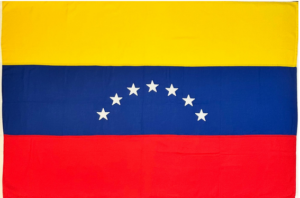
The results of a sociological survey conducted by Active Group in collaboration with Experts Club show that Ukrainians’ attitude toward Venezuela is generally more negative than positive.
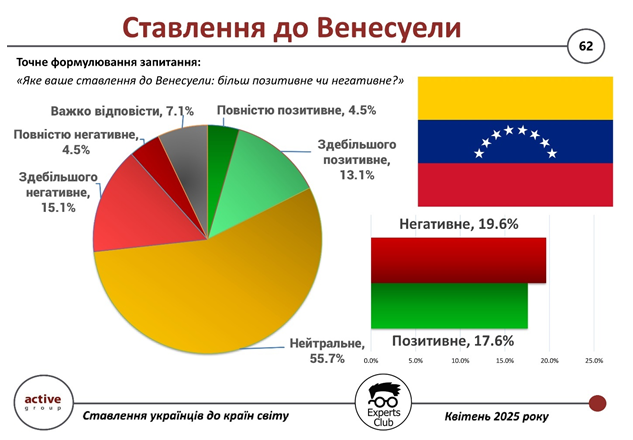
19.6% of respondents rated their attitude as negative, of which 15.1% said it was “mostly negative” and 4.5% said it was “completely negative.” At the same time, 17.6% of respondents expressed a positive attitude, including 13.1% who said it was “mostly positive” and 4.5% who said it was “completely positive.” The largest share, 55.7%, took a neutral position, while another 7.1% abstained from answering.
“Negative associations with Venezuela are mainly related to the economic and political crisis in the country. It often appears in the news as an example of a country where the socio-economic situation has deteriorated due to populist decisions. This creates a wary attitude among Ukrainians,” says Maksim Urakin, PhD in Economics and founder of the Experts Club information and analytical center.
Ukrainians perceive Venezuela mainly through the prism of problems that have become known from international news. Although a significant proportion of respondents take a neutral position, the negative image prevails over the positive.
ACTIVE GROUP, DIPLOMACY, EXPERTS CLUB, Pozniy, SOCIOLOGY, URAKIN
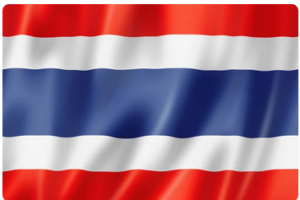
According to the results of a joint survey conducted by Active Group and the Experts Club analytical center, most Ukrainians have a neutral or positive attitude towards Thailand.
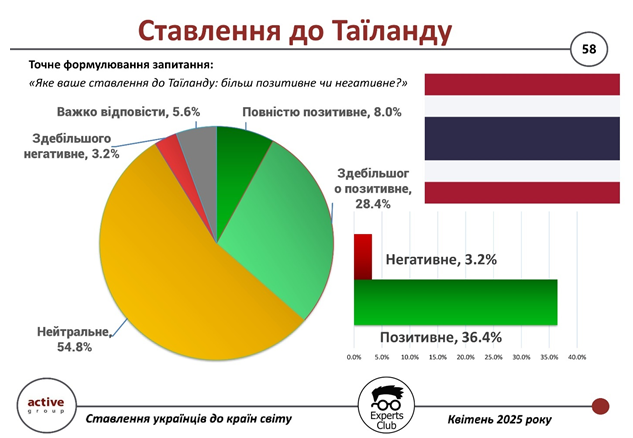
Thus, 54.8% of respondents rated their attitude as neutral, while 36.4% responded positively (of which 28.4% said “mostly positive” and 8.0% said “completely positive”). Only 3.2% of respondents expressed a negative attitude, while 5.6% were unable to answer the question.
“Thailand has long been one of the favorite destinations for Ukrainian tourists, especially in winter. Tourism shapes a positive image of the country in the Ukrainian public consciousness,” comments Maxim Urakin, PhD in Economics and founder of the Experts Club information and analytical center.
Overall, more than a third of Ukrainians have a favorable attitude toward Thailand, and more than half are neutral. These data indicate a positive tourist image of the country among Ukrainians, which creates potential for further development of cultural and economic ties.
The presentation of the study is available at the link.
ACTIVE GROUP, DIPLOMACY, EXPERTS CLUB, Pozniy, SOCIOLOGY, URAKIN